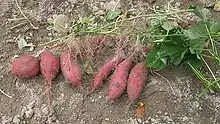고구마
Korean
Etymology
First attested in the Mulmyeonggo (물명고 / 物名考), 1824, as Early Modern Korean 고금아 (Yale: kokuma), borrowed from Japanese 孝行芋 (kōkō imo), a term used in the Tsushima dialect. Some earlier attestations are known, but they are in the context of quoting the dialectal Japanese word, not in a Korean context.[1]
| Korean words for potatoes and sweet potatoes |
|---|
|
When sweet potatoes (Ipomoea batatas) were first cultivated in Korea in the eighteenth century, the usual term for them was Sino-Korean 감져 (甘藷, gamjeo). However, this word became used for potatoes (Solanum tuberosum) as well when the latter were introduced to Korea in the nineteenth century. The potential for confusion between the two crops contributed to the growing popularity of the Japanese borrowing 고구마 (goguma). Most dialects, except for Jeju and Jeolla, eventually settled on 고구마 (goguma) as the word for sweet potatoes and 감자 (gamja) as the word for potatoes.[1] |
Pronunciation
- (SK Standard/Seoul) IPA(key): [ˈko̞(ː)ɡuma̠]
- Phonetic hangul: [고(ː)구마]
- Though still prescribed in Standard Korean, most speakers in both Koreas no longer distinguish vowel length.
| Romanizations | |
|---|---|
| Revised Romanization? | goguma |
| Revised Romanization (translit.)? | goguma |
| McCune–Reischauer? | koguma |
| Yale Romanization? | kōkwuma |
Noun

고구마 • (goguma)
- sweet potato
- (Internet slang) plot development which frustrates the reader (e.g. the protagonist fails to achieve their goal) [from c. 2012]
- Antonym: 사이다 (saida)
References
- 오인택 [ointaek] (2015) “조선후기의 고구마 전래와 정착 과정 [joseonhugiui goguma jeollaewa jeongchak gwajeong]”, in Yeoksa-wa gyeonggye, volume 97, pages 173—212